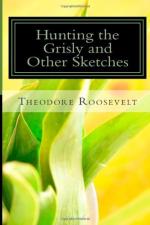“So I up and saddled the bronc’ and lit out for home,” concluded the narrator with the air of one justly proud of his own self-abnegating virtue.
The “town” where the judge above-mentioned dwelt was one of those squalid pretentiously named little clusters of make-shift dwellings which on the edge of the wild country spring up with the rapid growth of mushrooms, and are often no longer lived. In their earlier stages these towns are frequently built entirely of canvas, and are subject to grotesque calamities. When the territory purchased from the Sioux, in the Dakotas, a couple of years ago was thrown open to settlement, there was a furious inrush of men on horseback and in wagons, and various ambitious cities sprang up overnight. The new settlers were all under the influence of that curious craze which causes every true westerner to put unlimited faith in the unknown and untried; many had left all they had in a far better farming country, because they were true to their immemorial belief that, wherever they were, their luck would be better if they went somewhere else. They were always on the move, and headed for the vague beyond. As miners see visions of all the famous mines of history in each new camp, so these would-be city founders saw future St. Pauls and Omahas in every forlorn group of tents pitched by some muddy stream in a desert of gumbo and sage-brush; and they named both the towns and the canvas buildings in accordance with their bright hopes for the morrow, rather than with reference to the mean facts of the day. One of these towns, which when twenty-four hours old boasted of six saloons, a “court-house,” and an “opera house,” was overwhelmed by early disaster. The third day of its life a whirlwind came along and took off the opera house and half the saloons; and the following evening lawless men nearly finished the work of the elements. The riders of a huge trail-outfit from Texas, to their glad surprise discovered the town and abandoned themselves to a night of roaring and lethal carousal. Next morning the city authorities were lamenting, with oaths of bitter rage, that “them hell-and-twenty Flying A cowpunchers had cut the court-house up into parts.” It was true. The cowboys were in need of chaps, and with an admirable mixture of adventurousness, frugality, and ready adaptability to circumstances, had made substitutes therefore in the shape of canvas overalls, cut from the roof and walls of the shaky temple of justice.
One of my valued friends in the mountains, and one of the best hunters with whom I ever travelled, was a man who had a peculiarly light-hearted way of looking at conventional social obligations. Though in some ways a true backwoods Donatello, he was a man of much shrewdness and of great courage and resolution. Moreover, he possessed what only a few men do possess, the capacity to tell the truth. He saw facts as they were, and could tell them as they were, and he never told an untruth unless for very weighty reasons.




